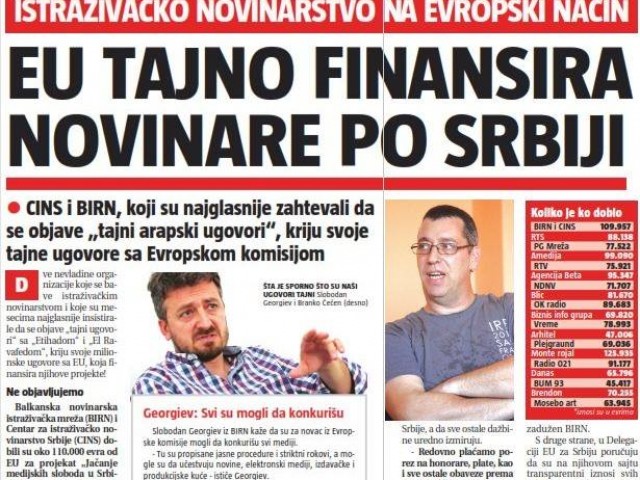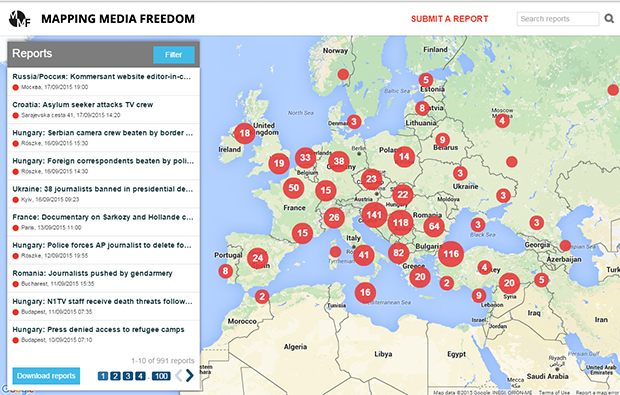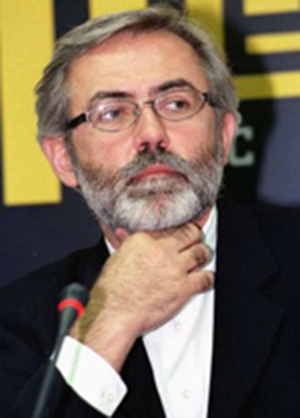7 Apr 2016 | Mapping Media Freedom, mobile, News and features, Serbia

The 17 March 2016 cover of Informer featured a photograph of Stevan Dojcinovic, editor-in-chief of the Crime and Corruption Reporting Network (KRIK), with accusations that he was part of a “mafia” trying to bring down the Serbian government.
The front page of Serbian tabloid Informer stands out from the other newspapers displayed at Belgrade’s countless cigarette kiosks. Its red and yellow coloured headlines scream in block capitals at everyone who passes by.
It is the word “Mafija” that attracts most attention on the morning of 17 March 2016. It’s printed on the front page, as is a blurry photo of a journalist. The journalist, Stevan Dojcinovic, is editor-in-chief at Crime and Corruption Reporting Network (KRIK). The headline translates: “Mafia is planning attack on family Vucic.” According to Informer, Dojcinovic and his colleagues at KRIK are the mafia and want to bring down the government of Serbian Prime Minister Aleksandar Vucic.
Psychological attacks on KRIK by the tabloid have happened so often that this was hardly surprising. KRIK has become well known throughout Serbia, not because of its investigative reporting, but because of the attention from Informer.
Informer was founded in 2012 and its editorial coverage has been called “pro-regime oriented” by Konrad-Adenauer-Stiftung, a German political foundation. The paper’s editor-in-chief, Dragan Vucicevic, is said to be a close friend of the prime minister’s.
Since its launch in July 2015, KRIK has published a series of revealing stories about corruption and misuse of office by several high-profile government officials. And ever since, KRIK has been targeted by Informer: KRIK journalists have been called foreign spies trying to bring down the government; they have been accused of spreading lies; they have been personally discredited on Informer’s front pages.
It began on 7 September 2015. KRIK published leaked footage showing one of the biggest drug lords of the Balkans meeting with Ministry of Police officials, including Ivica Dacic, a former prime minister. The video was posted on the KRIK website and caused immediate controversy. A day after the revelation, Informer published an article stating that KRIK was involved with opposition parties and that Dojcinovic is a “Western spy” backed by US embassy staff.
On 19 October KRIK published a thorough investigation into Belgrade’s mayor Sinisa Mali, who allegedly owns offshore companies dealing with selling apartments at the Bulgarian coast.
Exposing Mali, who is a political ally of Vucic’s, soon sparked a new round of allegations by Informer.
Early November 2015 Informer claimed that KRIK, as well as two other independent media organisations BIRN and CINS, were given foreign grants for publications of “false affairs against people close to the government”. Informer’s Vucicevic said on national broadcaster TV Pink, in a special 4-hour-long programme called “Bringing down Vucic”, that the media organisations were planning a step-by-step plot to bring down the government.
Serbia’s journalist unions condemned what they called a smear or lynch campaign. The chairman of the Independent Journalists Association of Serbia (NUNS), Vukasin Obradovic, said that Informer created “an atmosphere of fear and lynching in the society, which may have serious consequences for the personal safety of the journalists involved”.
But the investigative journalists from KRIK were not scared off. They were, in fact, working on their next investigation into another government official: the minister of health, Zdravko Loncar.
KRIK found out that Loncar had been involved with Serbia’s most notorious criminal gang known as the “Zemun clan” when he was still an unknown doctor working at an emergency ward back in 2002. He allegedly had received a free apartment as a reward for “finishing off” a severely wounded gang member by “injecting him with a fatal cocktail”.
KRIK published the full story on February 22. A day later Dojcinovic’s photo was featured on the Informer’s front page again. The article stated that KRIK’s editor-in-chief was “launching false scandals” and was “intentionally creating chaos in the country”. Health minister Loncar was invited to talk on TV Pink, where he did not respond to the allegations but instead accused KRIK of not paying taxes.
Up to that point KRIK had investigated cases of corruption involving high-profile state officials in Vucic’s inner circle. But what everybody was waiting for was an investigation into Vucic himself.
Then came March 18 2016. Informer once again published a photo of KRIK’s Dojcinovic on its front page. But this time it was different.
The tabloid revealed a story KRIK had not yet published about Vucic’s large real estate assets in Belgrade, which he is supposedly hiding under the names of family members.
Informer exposed details of an investigation by KRIK that they could not have obtained in an ordinary manner. According to KRIK, the Informer appears to have relied on information that could only have been gathered through secret service surveillance techniques including physically following journalists and phone tapping.
“For about a year Informer has been attacking us regularly,” Dojcinovic told Index on Censorship. “This is the first time we are being attacked before we even publish the story. Now they are using information from state intelligence agency to discredit us. I don’t care about a smear campaign, they can’t destroy my credibility with a smear campaign. But now the state is after us.”
Currently KRIK is still working on finishing their newest investigation, which is indeed about Vucic’s real estate assets. But meanwhile Dojcinovic fears for the fate of his sources.
“We’ve now seen that they know exactly who we are meeting with. There is pressure on our sources, most of them work in state institutions. Some have already been fired,” Dojcinovic said.
This article was originally posted at indexoncensorship.org
6 Jan 2016 | Mapping Media Freedom, mobile, News and features, Serbia

It was a Wednesday morning in early November when investigative journalist Slobodan Georgijev opened Informer, one of Serbia’s notorious tabloids. He had just arrived at his office, the newsroom of Balkan Investigative Reporting Network (BIRN), one of Serbia’s few independent media outlets. When he turned the page he was shocked by what he saw; a picture of his own face amongst two others, in an article calling three media outlets known for critical reporting of the Serbian government, including BIRN, “foreign spies”.
“It was funny and unpleasant at the same time,” Georgijev recalled, speaking to Index on Censorship. “Funny because I knew that this is just a campaign by Informer to undermine the credibility of independent journalists.” More importantly, he had begun worry about his own safety. “It’s also unpleasant because you never know how people will interpret such defamations.”
Several independent media houses — including BIRN, as well as Crime and Corruption Reporting Network (KRIK) and Center for Investigative Journalism Serbia (CINS) — have alleged that pro-government tabloids like Informer are running a smear campaign against them.
The first major incident followed the publication of a story about the cancellation of Prime Minister Aleksandar Vucic’s vacation in August 2015. Informer published an article saying that Vucic was forced to cancel his two day vacation in Serbia due to reporters from BIRN and CINS allegedly booking a room next to his.
The same newspaper also wrote that BIRN and CINS were meeting with European Union representatives on a weekly basis to plan to bring down the government.
“We are basically accused of being financed by the EU to work against our government,” Branko Cecen, director of CINS, told Index on Censorship. Cecen, like Georgiev, was also pictured and called a foreign spy in Informer. “Expressions like ‘foreign mercenaries’ and ‘joint criminal activity against their own state’ have been used.”
Informer newspaper is openly affiliated with the Serbian Progressive Party (SNS) of prime minister Aleksandar Vucic and has frequently been accused of political bias in favour of the party and the prime minister.
CINS, KRIK and BIRN have long reported on what they see as a slew of regular negative articles about themselves in tabloid newspapers with close ties to the government. There is no doubt that the three news outlets are targets because of their critical reporting on the government.
One of BIRN’s stories revealed a contract the Serbian government had signed with the national carrier of United Arab Emirates, Etihad Airways, to take over it’s state-owned counterpart Air Serbia. The deal had been financially damaging for Serbia, which was kept from the public until BIRN obtained and published the contract.
Another story investigated alleged corruption concerning a project for pumping out a flooded coal mine. BIRN found out that Serbia’s state-owned power company had awarded a contract to dewater the mine to a company who’s director is a close friend of the prime minister.
The coal mine revelations led to an angry speech about BIRN by Vucic on national television saying: “Tell those liars that they have lied again(.”
He also attacked the EU delegation in Serbia for being involved in discrediting the government by financing BIRN. “They got the money from Davenport and the EU to speak against the Serbian government,” the prime minister said, naming Michael Davenport, the head of the EU delegation in Belgrade.
BIRN’s editor-in-chief Gordana Igric told Index on Censorship she sees a resemblance to Serbia’s difficult nineties. “This reminds me of the regime of Slobodan Milosevic, a time when the prime minister also had a prominent role and critical journalists and NGOs were marked as foreign mercenaries,” she said. “What’s happening in Serbia today makes you feel sad and confused.”
Independent journalists find the path that the prime minister is taking alarming. Some compare him with the Turkey’s Recep Tayyip Erdoğan or the Russia’s Vladimir Putin. According to Cecen, the level of freedom of expression is at the lowest level since the time of strongman Milosevic. “There is an aggressive campaign against anybody and anything criticising the prime minister and his policies”, he said. “The prime minister has taken over most media in Serbia, especially national TV networks, but also local ones. His small army of social media commentators is terrorising the internet. It is quite bleak and frustrating.”
Regardless of Vucic’s verbal attacks towards the EU delegation, Serbia has opened the first two chapters in its EU membership negotiation in December 2015. This represents a big step towards eventual membership of the European Union. But the latest progress report on Serbia (November 2015) says the country needs to do much more in terms of fighting corruption, the independence of the judiciary and ensuring media freedom.
“The concern over freedom of expression is always expressed in these reports,” Cecen said. “But we see no influence of such reports since situation with media and freedom of expression is deteriorating daily.” Cecen is disappointed in the European Union’s support for independent media in Serbia and finds that EU officials show too much support for the Serbian government and the prime minister.
After he had seen his own face in the paper, Georgiev picked up the phone and called up Informer’s editor-in-chief Dragan Vučićević to ask for a better picture in the next paper. Georgiev jokes about it and clearly doesn’t let accusations and threats hold him back. “People around me are making jokes”, he said. “They call me a foreign mercenary, an enemy of the state.”
Georgiev pressed charges for defamation against Informer. “We are living in a state of constant emergency,” he continued, concerned about the state of press freedom in his country. “Serbia is not like Turkey. But it goes very fast in that direction.”
Mapping Media Freedom
Click on the bubbles to view reports or double-click to zoom in on specific regions. The full site can be accessed at https://mappingmediafreedom.org/
|
30 Oct 2015 | Europe and Central Asia, mobile, News and features, Serbia
The Association of Serbian Journalists reports that since 2013 there have been 65 attacks on Serbian journalists. Assailants in 11 of the incidents — around 17% of cases — have been prosecuted.
Believe it or not, a 17% conviction rate could be considered good news. But it isn’t enough.
International media organisations routinely assess that fewer than 10% of crimes committed against journalists worldwide result in prosecution. While the cavalier attitude by law enforcement and authorities to go after criminals gave rise to the phrase “impunity from prosecution,” many of us wonder if the term “immunity” might be more apt.
And that’s why I welcomed the initiative of Serbian authorities who, in early 2014, established a commission to support investigations into the deaths of Serbian journalists dating back to 1994, including Dada Vujasinović, Slavko Ćuruvija and Milan Pantić. In order to highlight the importance of their work and to raise the awareness of the importance of fighting impunity, my office supported the commission’s Chronicles of Threats campaign.
Ćuruvija, the owner of the newspaper Dnevni Telegraf and the magazine Evropljanin, was gunned down in front of his home in Belgrade in 1999. Thanks in part to the work of the commission, authorities re-opened the case last year and put four former state security officials under investigation for his murder. A trial is underway and while this is a start, his family and fellow journalists still need to see results.
This is why I why I wholeheartedly support all consciousness-raising efforts that take place on November 2 each year – the United Nations proclaimed International Day to End Impunity for Crimes Against Journalists which was initiated in 2013.
This landmark UN resolution condemns attacks on journalists and other media members. It also urges countries to do their utmost to prevent violence and make perpetrators accountable for their crimes, in order to promote a safe working environment.
But setting aside a day to cajole authorities to take the crimes against media seriously can only go so far. That is why the modest successes of the commission in Serbia provide a glimmer of hope that justice can be served.
But in order for societies to provide that safe working environment envisioned by the UN, a systematic array of steps must be undertaken at the local and national level. None of these steps are easy and their ability to succeed is questionable.
To begin with, local officials must be given the financial resources to conduct thorough investigations of all crimes committed. This is no small task in many of the 57 countries that comprise the Organization for Security and Co-operation in Europe — the region in which I work. Many of these nations have economies in transition, tax revenues are scarce and it’s a hard sell for authorities to suggest earmarking money to find justice for one class of victims when the needs of the whole community are not being adequately served.
Prosecutors and judges also need to be adequately trained to understand the importance of the fair application of existing criminal laws, especially when the rule of law in society is often buttressed only by a robust and independent media. This is the same media which is often critical of the prosecutors and judges who make up the judicial hierarchy.
In the end, getting past those hurdles may be seen, in retrospect, as the easiest steps. Because what’s really necessary to create a safe working environment is for society as a whole to accept that good journalism is necessary for a good society.
People must recognise that the free flow of information and ideas is essential in dynamic cultures and the secrecy and repression are antithetical to freedom and prosperity.
Creating a society where good journalism can flourish starts with making sure journalists can do their jobs and live to talk about it. And that means making sure that those who would run roughshod over journalists pay for their crimes.
This article was posted on 30 October 2015 at indexoncensorship.org
21 Sep 2015 | Mapping Media Freedom, mobile, News and features, Serbia

Investigative journalist Ivan Ninic knew something was wrong when he saw the two young men reach down. “I saw they were getting two metal bars,” said Ninic, who is the latest victim of violence against journalists in Serbia. Two young men, in tracksuits and baseball caps, assaulted him on a Thursday evening in late August, in Serbia’s capital, Belgrade. “They attacked me and stuck me brutally,” he told UNS, a Serbian association for journalists. “I have a haematoma under my eye, bruises on the thigh bone and an injury to my shoulder.”
Just a week earlier, at a Jazz Festival in the southern city of Nis, local journalist Predrag Blagojevic was beaten by a police officer for — in the words of the officer — “acting smart”. “He grabbed me, bent my arm behind my back and repeated several times ‘Why are you acting smart?’ Then he hit me in the head with his hand. He hit me twice,” Blagojevic stated after the incident. Blagojevic had been approached by the officer and asked for his identity papers. Blagojevic had asked “why?” The police officer took him to his car and started beating him.
Media freedoms in Serbia are on the decline. The country has been cited in 93 verified violations against the media reported to Index on Censorship’s Mapping Media Freedom project. A recent report by Human Rights Watch (HRW), painted a picture of journalists in several western Balkan countries, working in hostile environments whilst facing threats and intimidation.
“It’s certainly not going forward,” HRW researcher Lydia Gall said in an interview with Index on Censorship. “What in fact should be showing progress, is rather deteriorating.”
Gall interviewed over 80 journalists in Serbia, Kosovo, Macedonia, Montenegro and Bosnia-Herzegovina. The stories she heard were shocking.
“These are all countries that are transitioning,” she said. “They’re undergoing democratic development in, one would hope, a positive direction. But when you look at the documentation I’ve collected you’ll see a worrying picture unravel.”
The report contains examples of threats, beatings, and even the murder of several journalists. It also claims there is political interference, pressure and a lack of action by the authorities to investigate and prosecute those responsible for crimes against the media.
In Serbia alone Human Rights Watch reported 28 cases of physical attacks, threats, and other types of intimidation against journalists between January and August 2014.
NUNS (the Independent Journalists’ Association of Serbia) has documented a total of 365 physical and verbal assaults, and attacks, in the period from 2008 to 2014. This may be the tip of the iceberg since, according to NUNS, many media workers don’t report attacks.
Between May 2014 and June 2015, Index on Censorship’s Mapping Media Freedom project has received 77 reports of violations against Serbian journalists and media workers.
Most of the targeted journalists investigate corruption and allegations of war crimes. Both Ivan Ninic and Predrag Blagojevic report on corruption on a regular basis. “These are not popular topics in the Balkans,” Lydia Gall said. “There are always people in power trying to get them not to write about them.”
Serbia has undergone incredible change over the past two decades. During the Federal Socialist Republic of Yugoslavia censorship was directly imposed by the state. Few forget the difficulties of reporting in Serbia during the darkest moments of the 1990s. Means and methods of pressure and censorship are very different nowadays.
“It’s not necessarily the state going after the journalist anymore,” Gall explained. “But it’s more the state neglecting to properly investigate crimes against journalists.”
“If it’s not physical interference or abuse, then it’s threats, or so-called friendly advice. In some cases journalists are being sued for civil libel and end up spending most of their time in courts instead of doing their work. It can be done in very subtle ways.”
This all contributes to a hostile environment for journalists to work in, the HRW report concludes. “You have to be a brave person to do this type of reporting in the Balkans,” said Gall.
Sometimes pressure on the media in Serbia is not even that subtle. Current Prime Minister Aleksandar Vucic, has been accused of being overly hostile against the media. He has publicly labeled Balkan Investigative Reporting Network (BIRN) foreign spies . The current government has also been accused by some journalists of involvement in several cyber attacks on critical online media portals, such as Pescanik.
“Improving media freedom is an important condition in Serbia’s negotiation process with the European Union for membership. But EU’s pressure on Serbia is too weak,” said Gall.
“They’re mainly looking at the legislative framework. On paper it looks great. The problem comes to light when you look on the ground. When you speak to journalists, who are living this reality every day.”
Meanwhile the Serbian journalist associations, NUNS and UNS, are trying to put pressure on the authorities to track down the attackers of Ivan Ninic.
Ninic is known for his investigations into corruption within high levels of government. He founded the Center for the Rule of Law, an NGO, and is planning to launch a website to publish investigative reports.
He believes the attack is a warning: “I expect the police will find and punish not only the attackers, but also the masterminds, so that I know who is sending me this message,” he said in a statement.
Mapping Media Freedom
Click on the bubbles to view reports or double-click to zoom in on specific regions. The full site can be accessed at https://mappingmediafreedom.org/
|
This article was published on 16 September 2015 at indexoncensorship.org




